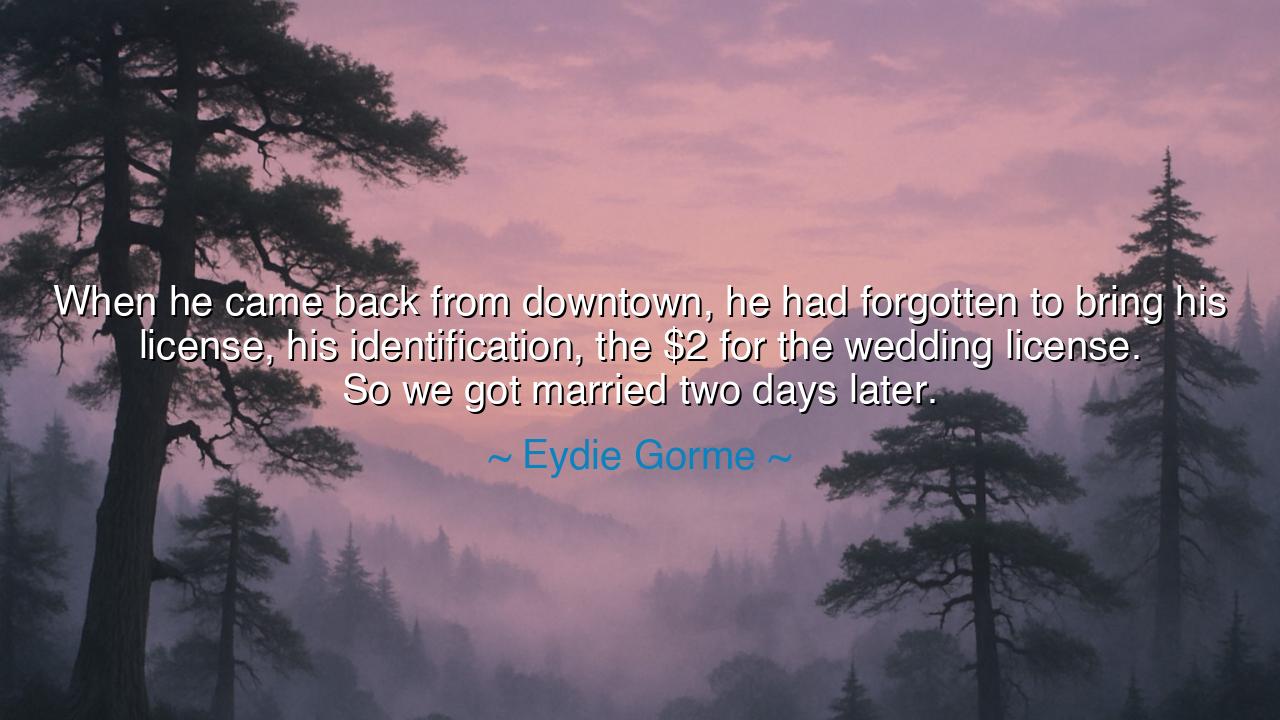
When he came back from downtown, he had forgotten to bring his
When he came back from downtown, he had forgotten to bring his license, his identification, the $2 for the wedding license. So we got married two days later.






In these charming words, Eydie Gorme recounts the humble and human beginnings of a sacred union, reflecting on the unpredictability and simplicity of marriage. She tells of how, when her beloved returned from downtown, he had forgotten his license, identification, and the $2 for the wedding license, delaying their planned ceremony. Yet, in this minor misstep, there is revealed a deeper truth: love and commitment transcend bureaucracy and ritual, thriving even amidst forgetfulness, imperfection, and the small chaos of daily life.
The origin of this anecdote lies in Gorme’s personal experience as a singer and public figure, yet its resonance is universal. Across ages, the path to union has often been shaped by practical realities as much as by emotion. In ancient Rome, couples might have faced logistical hurdles—witnesses, dowries, or the blessing of elders—yet the essence of marriage was the pledge itself, not the precise timing or paperwork. Gorme’s story reminds us that love is adaptable, resilient, and capable of flourishing despite minor obstacles.
History offers parallel examples of serendipitous unions. Consider Elizabeth Barrett and Robert Browning, whose clandestine courtship and hasty marriage circumvented family opposition and social expectation. Their commitment was not dependent on ceremony or ritual alone, but on the deep bond they shared, a reminder that love’s power often surpasses procedural requirements. Like Gorme’s anecdote, these unions demonstrate that human connection is robust, and small delays or errors do not diminish the significance of commitment.
Gorme’s story also highlights the humor and humility of life. The forgotten license, identification, and coins inject levity into what is often imagined as a solemn event, revealing that even sacred ceremonies are enacted by fallible human beings. In this, there is wisdom: marriage is not perfection in execution, but devotion in intent. The minor missteps and delays enrich the narrative of love, making the story memorable, human, and endearing.
Ultimately, this quote is a meditation on resilience, adaptability, and the essence of commitment. Eydie Gorme teaches future generations that love is not dependent on flawless execution, legal formalities, or exact timing. Let this wisdom endure: the heart, not the paperwork, governs the significance of union, and true commitment can weather small mistakes, logistical oversights, and the unpredictabilities of life. In love, as in life, it is intention and fidelity that render the moment sacred, even when delayed by the smallest of human errors.






VAVan Anh
I find this quote both amusing and insightful in its ordinariness. It’s a reminder that not everything in life goes as planned, even on the verge of something monumental like marriage. But maybe that’s the beauty of it — imperfection doesn’t stop love from happening. I wonder, though, how many modern couples would react with the same patience and humor? Have we lost that lighthearted acceptance of human error?
ZZzin zin
What stands out to me here is how casual and unpretentious the situation feels. There’s no drama, no grand gesture — just a small mistake and a postponed plan. In today’s world of elaborate weddings, this simplicity feels refreshing. Do you think people today could still embrace that kind of easygoing attitude toward marriage, or have we become too focused on perfection and spectacle in celebrating love?
THTam Ho
It’s funny and touching at the same time. I like how it shows that even something as important as a wedding can be disrupted by simple forgetfulness, yet love still finds its way. It makes me wonder how couples handle these little frustrations — do they laugh them off, or do they create tension? Maybe the real beauty of relationships lies in how partners navigate such small but telling moments.
CDNguyen Chau Duc
This quote captures such a relatable moment — the kind of everyday mishap that becomes part of a couple’s shared lore. I’m curious, though, does this reflect something deeper about timing and fate? Maybe the two-day delay was symbolic in some way, like a gentle pause before a lifelong commitment. Do you think small accidents like this can sometimes serve as quiet tests or reminders from life itself?
MT8E_Phan Thi Minh Thu
I find this story surprisingly heartwarming — it shows how life’s most significant moments can unfold through small, almost comical mistakes. It makes me wonder, did this delay change anything about how the couple viewed their marriage later on? Sometimes a minor inconvenience can add humor and perspective to an otherwise serious occasion. It’s a reminder that love stories aren’t perfect; they’re made of human forgetfulness and laughter.